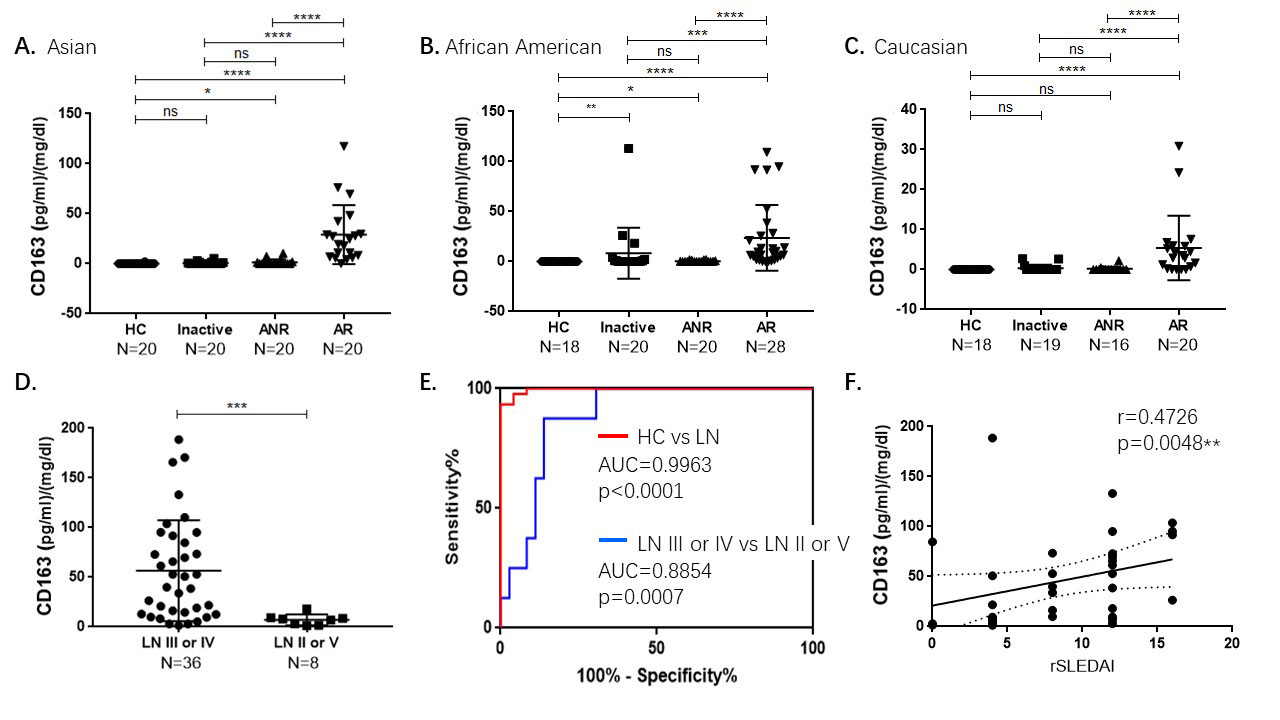Session Information
Session Type: ACR Abstract Session
Session Time: 4:30PM-6:00PM
Background/Purpose: CD163 is a marker for alternatively activated M2 macrophages, which have been implicated in the pathogenesis of lupus nephritis (LN). The potential of urine CD163 as a novel biomarker to reflect renal disease activities and pathological changes in LN was investigated.
Methods: Urine samples were obtained from LN patients with multiple ethnicities, assayed for CD163 using ELISA and then normalized to urine creatinine. Urine samples of healthy volunteers, inactive SLE, or active SLE patients without renal involvement were used as controls. CD163 was also measured in urine samples of an independent LN cohort with concurrent renal biopsies, and its correlation with renal pathology as well as clinical parameters were analyzed.
Results: Urine CD163 was significantly elevated in active LN when compared with healthy controls, inactive SLE, or active SLE patients without renal involvement in Asian, Caucasian or African American patients (all p< 0.001). In 44 LN patients with concurrent renal biopsies, urine CD163 was dramatically increased in patients with proliferative glomerulonephritis (LN III or IV) when compared with that in other histological patterns (LN II or V) (p< 0.001) (Figure 1). Urine CD163 significantly correlated with SLEDAI, rSLEDAI, urine protein/creatinine and C3. It also strongly correlated with activity index of renal pathology, particularly fibrinoid necrosis, cellular crescents and interstitial inflammation (all p< 0.01).
Conclusion: Urine CD163 discriminates patients with active lupus nephritis from other SLE patients and is significantly elevated in LN with proliferative glomerulonephritis. It also excellently correlates with multiple clinical parameters reflecting lupus disease activities as well as renal pathological activity index.
To cite this abstract in AMA style:
Zhang T, Saxena R, Mok C, Petri M, Mohan C. Urine CD163 Significantly Discriminates Active Lupus Nephritis and Strongly Correlates with Proliferative Glomerulonephritis [abstract]. Arthritis Rheumatol. 2019; 71 (suppl 10). https://acrabstracts.org/abstract/urine-cd163-significantly-discriminates-active-lupus-nephritis-and-strongly-correlates-with-proliferative-glomerulonephritis/. Accessed .« Back to 2019 ACR/ARP Annual Meeting
ACR Meeting Abstracts - https://acrabstracts.org/abstract/urine-cd163-significantly-discriminates-active-lupus-nephritis-and-strongly-correlates-with-proliferative-glomerulonephritis/

